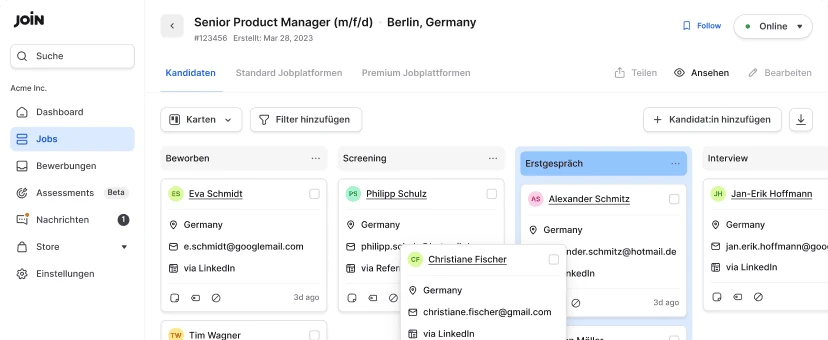Best interview questions for your hiring process
Waiter/Waitress Interview questions
Waiters are skilled conversationalists and excellent communicators. They work quickly and efficiently to help bring customers their food and beverages and ensure their visit to your restaurant is pleasant and memorable, for all the right reasons! As so much responsibility lies in their hands, it is essential that you hire the right person.
You should seek these skills in your Waiter or Waitress:
- Ability to perform basic mental math.
- Skilled communicators.
- Able to work on their feet for extended periods.
- Rapid problem-solving skills.
- Attention to detail.
- Knowledge of food hygiene procedures.
- Ability to work independently and as part of a team.
Interviewing a Waiter/Waitress
Without the right Waiter or Waitress, your customer service will greatly suffer. Your Waiting Staff will be the first point of contact for any questions, complaints or compliments your customers may have, so it is important to correctly vet the candidates!
To give you a pointer in the right direction for your interview process, we’ve put together some example questions that you can use. These will give you an idea of whether your candidate is right for the role, early on!
How to open the job interview
Most Waiting Staff will be excellent people-focused individuals. However, this doesn’t mean they won’t be nervous during the interview process!
Too many nerves can make it difficult to properly assess the candidate, so to help combat this it is a good idea to ask a few positive and upbeat interview questions at the start of your conversation. This will allow the candidate to warm up and improve the quality of the rest of the interview.
Best interview questions for your hiring process
See our Waiter/Waitress job descriptions hereFor the interview
A positive opener to start
What is one of your proudest moments as a Waiter/Waitress?
What is something you enjoy about being Waiting Staff?
Behavioral Questions
What types of working environments have your previous restaurant roles been? Which did you enjoy the most?
If receiving a customer complaint when working a busy shift, how do you remain positive?
Customer complaints are never pleasant, but are all too common! Knowing your team have learned some behavioural techniques to stay calm, cool and collected when receiving these complaints is a huge peace of mind.
When working through an extremely busy shift, waiting several tables at once, how do you stay organised and motivated?
This is a situation that Waiting Staff will often be in. Customer service is critical to the success of your business, so knowing your Waiter or Waitress has some behavioural and organisational techniques up their sleeves for busy periods is crucial.
How would you deal with a particularly loud or unruly table?
Not all customers will be pleasant. Knowing your potential hire will have the communication skills to help keep a table under control, or to pass the information on to teammates if they need assistance is a huge tick in the box for your candidate.
When working longer shifts, what techniques do you employ to stay motivated?
Waiting Staff can occasionally work long shifts. If your candidate has learned behaviours or techniques to help deal with this e.g. taking occasional breaks, this is a massive plus!
Soft Skills
If a customer ordered a dish that was sold out, what steps would you take to navigate this situation?
This can happen from time to time when working with food and beverages. Your candidate should be able to walk you through communicating the problem with the customer and recommending a similar dish. They should never simply exchange the dish without communicating this to the customer.
What skills do you think make you the ideal Waiter/Waitress?
Here, you give the candidate a chance to brag about their Waiting Staff skills! They may mention soft or hard skills here. It is also a perfect chance to gauge their confidence and communication skills.
If you noticed a colleague making a mistake with a customer’s drink preparation, what would you do?
An ideal candidate will be able to quickly and quietly show their colleague where they have gone wrong while offering advice on how to avoid this situation in the future. The exchange should remain professional and friendly while minimising customer disruption.
How do you ensure you’re providing the best possible service to each customer you serve?
This is a test of a candidate’s adaptability. Employing communication skills to figure out a tailored approach with each customer will be the difference between good and great service.
Hard Skills
What, if any, food and beverage training have you undertaken?
Whether this is an essential component for your role will depend on your business. But, in any case, it is helpful to know this about your candidate so that you know how much onboarding will need to be done.
Do you have experience with preparing or making any drinks or dishes?
Again, this question will depend on your business. Some Waiting Staff will need to prepare drinks, while others will simply deliver them to tables. Still, knowing whether your candidate has experience here is useful.
When working with food, how do you ensure you’re adhering to safety protocols?
Here, you’re looking for a select few points that show your candidate is experienced with food safety. This can vary from not leaving dishes sitting out, transporting hot dishes or drinks in a particular way to ensuring cutlery is changed for every table.
What experience do you have using cash registers and/or card machines?
In many cases, the Waiting Staff will deal with the cheque and payments part of a customer’s experience. Knowing whether they have done this in the past will give you a further idea of their onboarding process.
Do you have any experience in other areas of restaurant work, such as tending a bar?
This shouldn’t be a dealbreaker, but can be good to know if you’re looking for someone who can be trained to work in more than one area.
Operational / Situational Questions
Imagine you have provided the kitchen staff with a customer’s order, and then discover the wrong dish has been prepared. What steps do you take here?
Speed should be of the highest priority here. The mistake should be communicated to both the customer and kitchen staff, and the correct dish should be prioritised. A small compensation can be offered to the customer, for example, a free drink. It is great if learnings can be taken from the situation too.
Describe a time when you’ve had to deal with a particularly difficult customer. How did you control the situation and minimise disruption?
Sadly, not all customers will be easy to deal with. In some cases, some work will need to be put in! A candidate should be able to utilise a selection of communication techniques while remaining calm and professional. Here you’ll get an idea of how well the candidate can manage this and their experience in this area.
Walk me through your process when cleaning a table ready for new customers. Which products do you use and how do you ensure high hygiene standards?
A clean table is something that customers expect. However, it is also essential for a good hygiene score. Candidates should be able to name steps such as switching out cutlery, napkins and placemats as well as using a sequence of cleaning products to kill bacteria.
Describe a time when you have accommodated a customer with allergies or special dietary requirements.
This is a scenario servers will often find themselves facing. Here, attention to detail is essential. A list of requirements should be taken and passed on to the chef, with additional communication occasionally required.

Start hiring and prepare your interview
All platforms are available for you to promote your job through JOIN.
Create job ad for free


Restaurant types can differ greatly. They can vary from fast food to gourmet cuisine or a diner-type atmosphere. Knowing your Waiting Staff’s experience will help you imagine how they will fit into your company. In terms of their working style, this will further aid you to imagine how they will fit with your business, although mentioning adaptability can earn bonus points!